12 Healthiest Iced Teas on Grocery Shelves—and 4 To Avoid
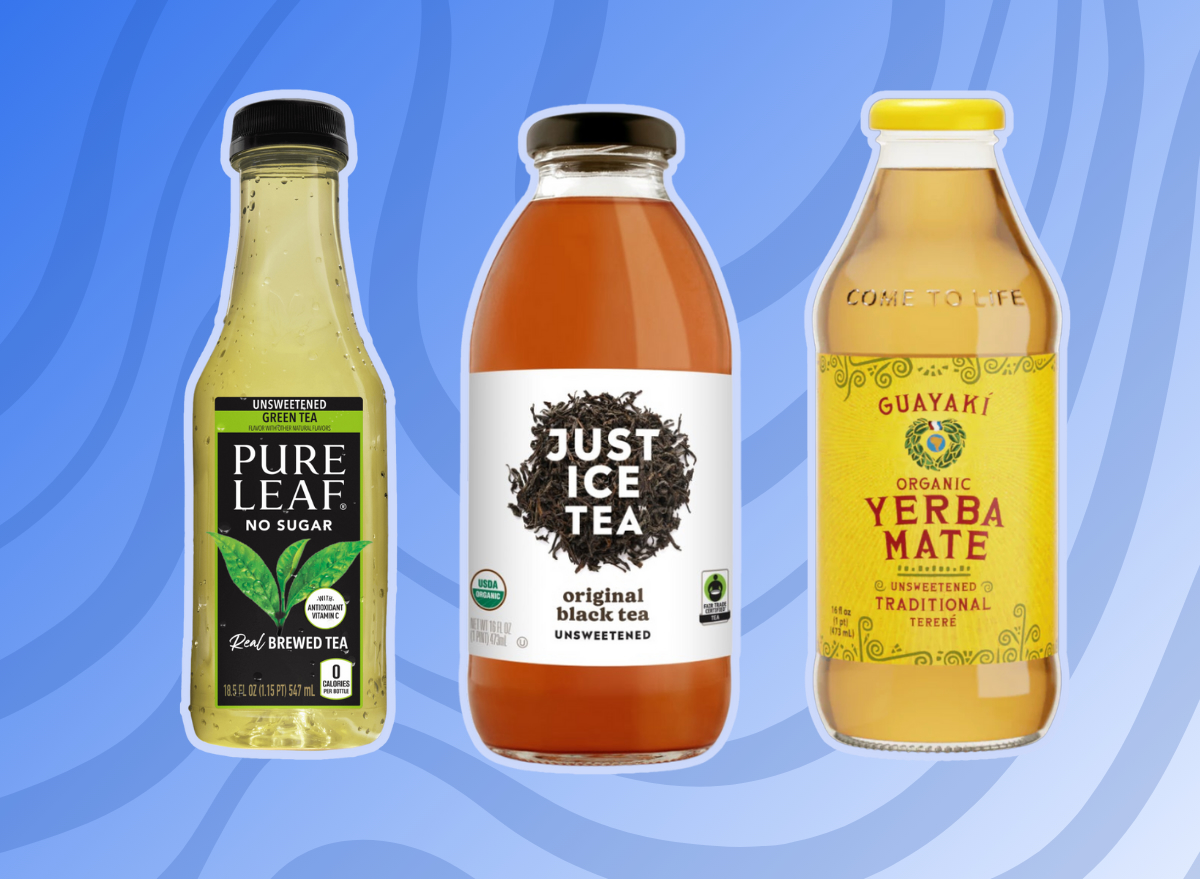
Iced tea holds a special place in the hearts of many Americans, offering relief during blazing summers or acting as a refreshing everyday drink packed with benefits. Tea is a powerhouse of antioxidants, particularly polyphenols, which combat oxidative stress and inflammation. Its flavonoids support heart health by lowering “bad” cholesterol levels and blood pressure. Varieties like green tea can boost metabolic rate and aid weight loss, while its moderate caffeine and L-theanine content promotes mental alertness, enhancing mood and focus.
But there’s often a serious pitfall regarding this brew: sugar. Store-bought iced teas are often chock full of added sugars, with some bottled options delivering over 100% of your daily sugar intake in just one serving. According to the 2020-2025 Dietary Guidelines for Americans, coffee and tea account for 11% of total added sugars in the American diet, and one study found that tea accounts for almost all of these added sugars. This is particularly concerning considering that some experts speculate that rising sugar-sweetened beverage consumption may be a culprit for America’s obesity epidemic.
In response to growing health consciousness, many iced tea brands have introduced healthier alternatives to fuel Americans with better-for-you ingredients. However, choosing a healthy iced tea can be a challenge as scores of brands line grocery store shelves. To simplify your selection process, we rounded up 12 of the healthiest iced teas in your local market and even pointed out 4 to avoid so you can make healthy decisions a breeze.
How we chose the healthiest iced teas
- Low or no added sugars: As many bottled iced teas (and other canned beverages) are loaded with added sugars, it’s important to consume tea containing either no or very low added sugar, as these calories can add up before you know it. The American Heart Association, a key trailblazer in American health, suggests that men should consume no more than 36 grams of added sugar daily and women should aim for a maximum of 25 grams. Too much added sugar has been linked with serious health risks such as heart disease and obesity.
- No artificial sweeteners or colorings: Many studies have examined the health and safety of artificial sweeteners and colorings. As this data is murky, we ensured that all our “best” iced teas didn’t include artificial sweeteners or colorings and were instead sweetened with stevia, monk fruit, or fruit juice. Additionally, none of our favorite teas needed to be colored—why does tea need to be electric pink, anyway?
- Not too much caffeine: Tea naturally contains caffeine, and even decaf versions can contain trace amounts, which may not be ideal for those with sensitivities. For this reason, none of our choices are heavily caffeinated to help you cut down on the jitters. It’s important to remember that the FDA suggests that the average, healthy adult limits their caffeine intake to 400 milligrams a day, which is well above a single serving of tea.
The 12 Healthiest Store-Bought Iced Teas
Best: Pure Leaf Unsweetened Green Tea
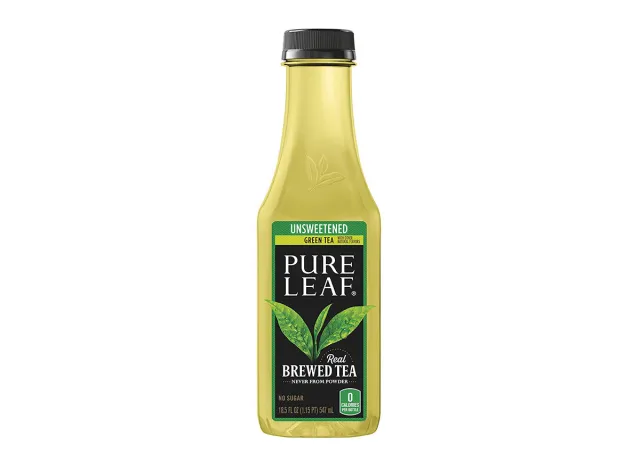
Calories: 0
Fat: 0 g (Saturated fat: 0 g)
Sodium: 0 mg
Carbs: 0 g (Fiber: 0 g, Sugar: 0 g)
Protein: 0 g
Pure Leaf’s unsweetened green tea is a great, non-bitter option for those looking for the traditional medicinals found within green tea without any sweeteners or additives. Green tea is filled with antioxidants, and the polyphenols naturally found in green tea have been shown to aid in staving off numerous conditions, such as certain types of cancer, diabetes, and cardiovascular disease. As a bonus, Pure Leaf’s unsweetened green tea is made with the addition of ascorbic acid, which provides 110% of your daily vitamin C needs.
Best: Milo’s Unsweet Tea
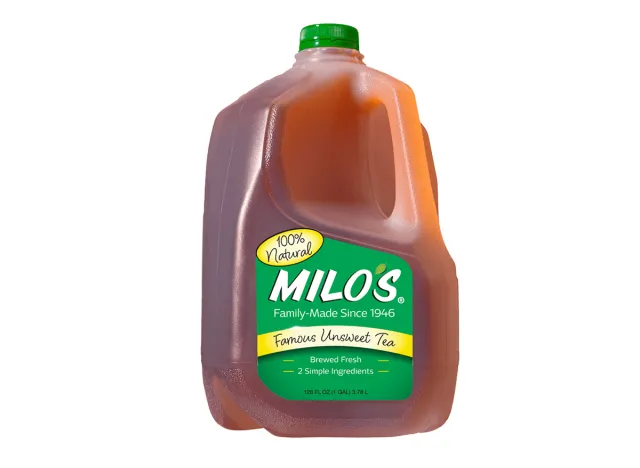
Calories: 0
Fat: 0 g (Saturated fat: 0 g)
Sodium: 3 mg
Carbs: 0 g (Fiber: 0 g, Sugar: 0 g)
Protein: 0 g
Milo’s is a staple at many grocery stores and excels in comparison to many other gallon-sized tea brands as Milo’s does not contain GMOs, added flavors, citric acid, phosphoric acid, high fructose corn syrup, phosphoric acid, potassium sorbate, or sodium benzoate. Additionally, this tea is preservative-free with no added acid (so make sure to keep this tea refrigerated), and this tea truly only consists of two quality ingredients: filtered water and freshly brewed tea. Feel free to add some freshly squeezed lemon for extra zing (and vitamin C!).
Best: GT’s Aura Collagen Tea
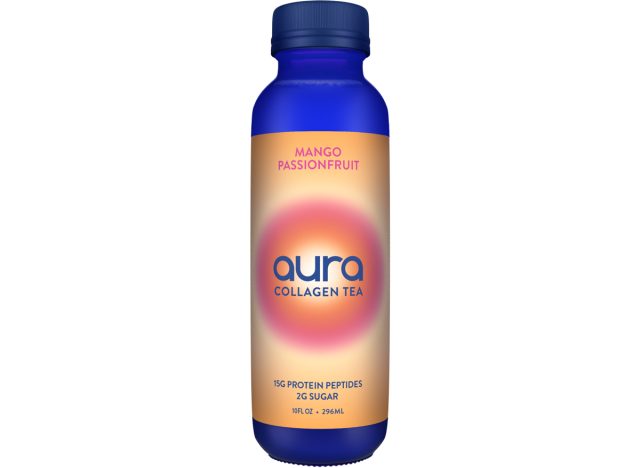
Calories: 70
Fat: 0 g (Saturated fat: 0 g)
Sodium: 40 mg
Carbs: 6 g (Fiber: 0 g, Sugar: 2 g)
Protein: 15 g
GT’s, perhaps best known as the original bottled kombucha brand, has unveiled a line of collagen tea. Aura collagen tea is made with real tea leaves (the mango passionfruit variety is made with white tea, for example) and real collagen.
Collagen is a protein that acts as structural support between connective tissues and aids in many health outcomes, including skin elasticity and hair density, and may even aid in bone mineral density. As we age, we tend to lose our collagen (and also no longer produce it ourselves), so drinks such as Aura Collagen Tea may aid in replenishing these counts. As a bonus, each bottle only contains 70 calories, no added sugar, and a whopping 15 grams of protein.
Note that this tea is sweetened with erythritol and stevia, so it does contain non-nutritive sweeteners.
Best: Just Ice Tea Unsweetened Original Black Tea
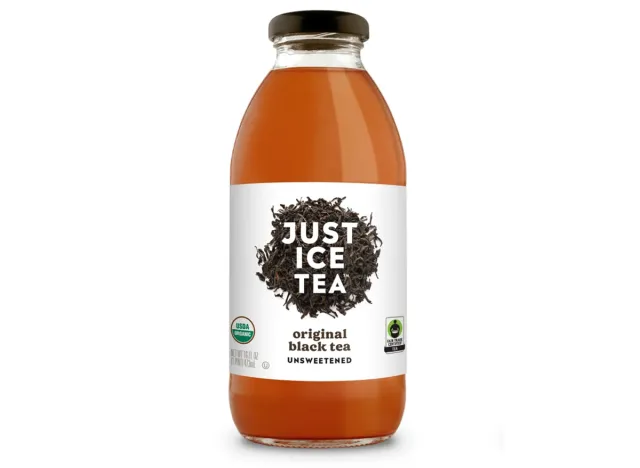
Calories: 0
Fat: 0 g (Saturated fat: 0 g)
Sodium: 0 mg
Carbs: 0 g (Fiber: 0 g, Sugar: 0 g)
Protein: 0 g
Just Ice Tea was born out of the closure of the well-known tea brand Honest Teas in an effort to continue a mission of not only healthier tea options but also to support the organic, fair-trade farms that had worked with Honest for 23 years. Just Ice Tea combines all the goodness of its former glory, and their USDA-certified organic bottled black tea is a non-bitter blend made with both Assam tea from the north of India and Nilgiri tea from Tamil Nadu in the south of India. This unique flavor gives a strong caffeine punch as black tea naturally contains more caffeine than other blends.
Best: Liquid Death Dead Billionaire (Armless Palmer)
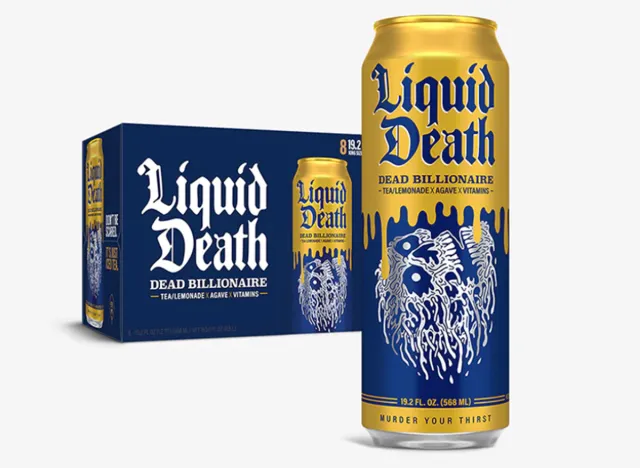
Calories: 30
Fat: 0 g (Saturated fat: 0 g)
Sodium: 15 mg
Carbs: 7 g (Fiber: 0 g, Sugar: 6 g)
Protein: 0 g
Despite its metal name, Liquid Death’s Dead Billionaire is gentle on the system and beneficial for your health. What looks like a pretty hardcore energy drink actually only consists of 30 calories and 6 grams of sugar sourced directly from agave. This lower-calorie drink also contains vitamins B6 and B12, which may support energy levels. Additionally, this tea contains 30 grams of caffeine, which is a manageable amount for most consumers. It won’t leave you feeling jittery like a traditional energy drink.
Like all Liquid Death drinks, this drink is free from plastic, helping accomplish the goal of “death to plastic.”
Best: Rishi Dandelion Ginger Sparkling Botanical Tea
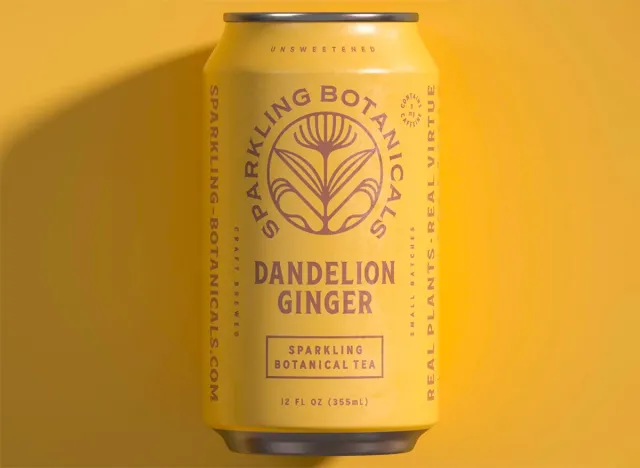
Calories: 10
Fat: 0 g (Saturated fat: 0 g)
Sodium: 0 mg
Carbs: 2 g (Fiber: 0 g, Sugar: 0 g)
Protein: 0 g
Dandelion ginger? Count us in! Rishi’s sparkling botanical teas combine oft-overlooked flavors for a seriously mouth-watering taste experience. This Japanese green tea has been fermented with black koji and combined with tonic herbs and red chili to create that classic ginger beer burn while also soothing the gut microbiome. This sparkling tea is also great as a mocktail and provides 8% of your daily iron needs and 2% of your daily potassium. Don’t love the spice of ginger? Rishi offers a plethora of flavors, including Schisandra Berry and Grapefruit Quince.
Best: Guayaki Organic Yerba Mate: Unsweetened Traditional
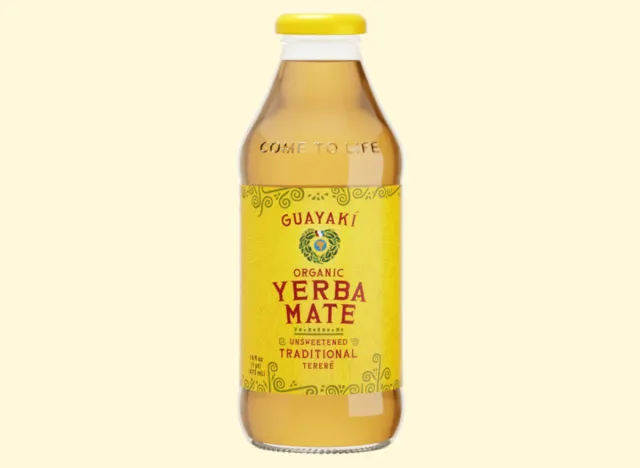
Calories: 10
Fat: 0 g (Saturated fat: 0 g)
Sodium: 10 mg
Carbs: <1 g (Fiber: 0 g, Sugar: 0 g)
Protein: 1 g
Yerba Mate, the traditional tea drunk by both the indigenous Guaraní and Tupi communities in what is now Paraguay, has taken North America by storm due to its health benefits as it includes not only antioxidants similar to green tea but also vitamin C, thiamine, riboflavin, and vitamin B6 (amongst others). However, many brands chock their teas full of sugar because of yerba mate’s naturally earthy flavor. True mate fans will leap at Guayaki’s unsweetened traditional tea which packs all the benefits into one bottle without any health risks. Each bottle contains 140 milligrams of caffeine and just 10 calories.
Best: Swoon Raspberry Tea
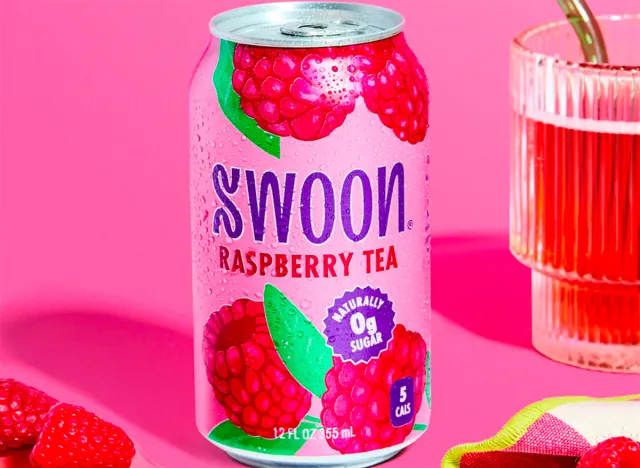
Calories: 5
Fat: 0 g (Saturated fat: 0 g)
Sodium: 5 mg
Carbs: 2 g (Fiber: 0 g, Sugar: 0 g)
Protein: 0 g
Swoon’s Raspberry Tea combines the power of vegetable fiber, raspberry juice concentrate, monk fruit extract, and just a pinch of stevia to create a slightly sweet black tea that tastes of raspberries and summertime fun. With only five calories and no fat or sugar, this tea is both uplifting and beneficial as it contains 25% of your daily vitamin C needs without any unwanted unnatural flavors or preservatives. The best part is, Swoon is dedicated to creating drinks that are viable for those with diabetes as co-founder Jen was diagnosed with type 1 diabetes as a young child. This personal touch adds a level of commitment to Swoon that many mainstream companies lack.
Best: Matcha LOVE Unsweetened Japanese Matcha + Green Tea Energy Shot
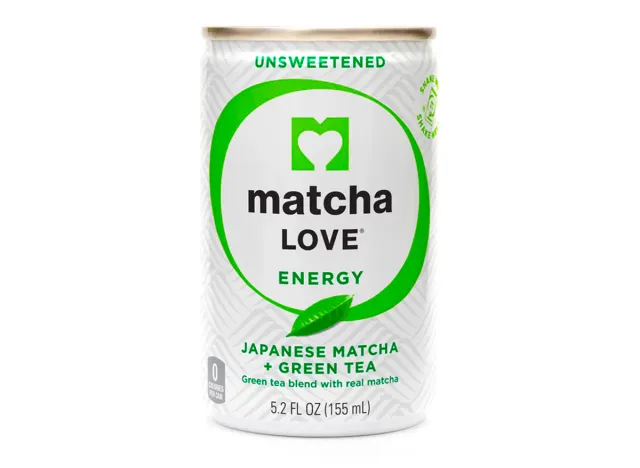
Calories: 0
Fat: 0 g (Saturated fat: 0 g)
Sodium: 15 mg
Carbs: 0 g (Fiber: 0 g, Sugar: 0 g)
Protein: 0 g
Put down that Five Hour Energy Shot (we beg), and instead opt for matcha LOVE’s unsweetened Japanese Matcha + Green Tea Energy Shot. This all-natural, GMO-free blend combines the caffeine power of green tea with matcha to provide approximately 192 milligrams of catechin antioxidants per can. These specific antioxidants fight against oxidative stress and atherosclerosis, aka the buildup of fats and cholesterol along the artery wall. Additionally, this little can contain no sugar, so you won’t experience an unwanted sugar crash.
Best: Oobli
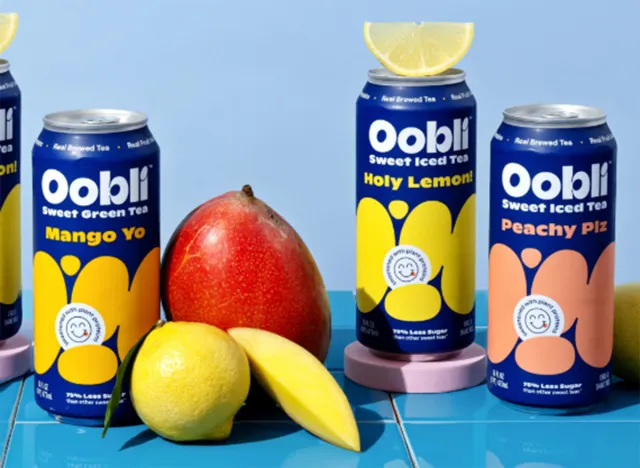
Calories: 50
Fat: 0 g (Saturated fat: 0 g)
Sodium: 15 mg
Carbs: 11 g (Fiber: 1 g, Sugar: 7 g)
Protein: 0 g
Oobli Sweet Iced Teas are revolutionary in the tea world as they are the only drink on the market to be made with sweet proteins and without zero-calorie sweeteners like sucralose and stevia, or sugar alcohols like erythritol. These “sweet proteins” are derived from minute amounts of protein in fruit and act as a sugar alternative. While being deliciously sweet, these sweet proteins don’t trigger a rise in blood sugar or insulin, so these drinks may be perfect for those with diabetes. These sugars also don’t affect the gut microbiome, so you won’t feel a slog or sugar crash after consuming. It is important to note that while this tea does lean on “sweet proteins,” it does contain 7 grams of sugar, thanks to the agave syrup added to this drink.
Best: Wildwonder: Peach Ginger
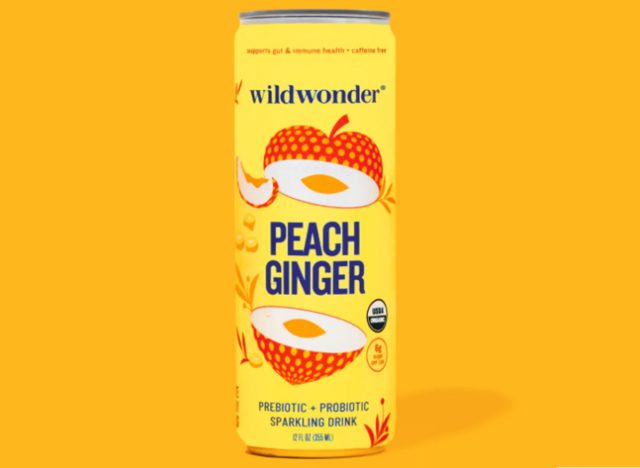
Calories: 35
Fat: 0 g (Saturated fat: 0 g)
Sodium: 0 mg
Carbs: 12 g (Fiber: 5 g, Sugar: 6 g)
Protein: 0 g
Wildwonder combines the best of both worlds by infusing ginger tea with prebiotic fiber and live probiotics to aid in a healthy gut microbiome. Wildwonder is naturally sweet thanks to the infusion of peach puree, agave nectar, and monk fruit extract. This drink also includes Jerusalem artichokes (which are not artichokes, nor are they from Jerusalem) and inulin, two sources of prebiotics that act as “fuel” for live probiotics to support a healthy gut. Each can contains 5 grams of fiber thanks to these additions. This herbal, sparkling tea really has it all!
Best: Halfday Lemon Iced Tea
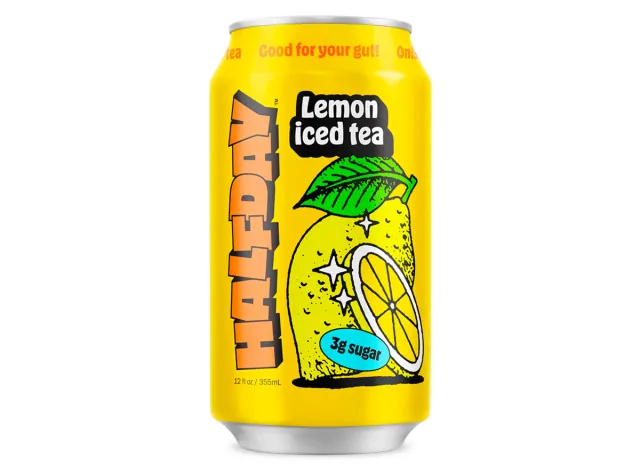
Calories: 30
Fat: 0 g (Saturated fat: 0 g)
Sodium: 5 mg
Carbs: 12 g (Fiber: 8 g, Sugar: 3 g)
Protein: 0 g
Halfday’s Lemon Iced Tea is a go-to for gut health as this refreshingly delicious blend includes organic prebiotic agave fiber, apple juice concentrate, lemon juice concentrate, and lemon juice extract. This tea may help aid in gut regularity as it includes 8 grams of fiber or 29% of your daily recommended fiber intake. This iced tea is also certified gluten-free and vegan, and stevia leaf extract gives this iced tea a slightly sweet lift without any artificial additives that may make your stomach wonky.
4 Teas to Avoid
Worst: Gold Peak Lemon Tea
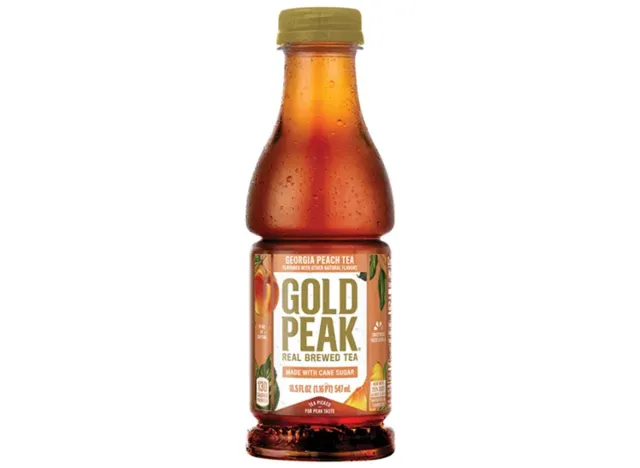
Calories: 130
Fat: 0 g (Saturated fat: 0 g)
Sodium: 30 mg
Carbs: 34 g (Fiber: 0 g, Sugar: 34 g)
Protein: 0 g
Perhaps it’s not so surprising that Gold Peak Tea is packed full of cane sugar as it’s owned by one of the biggest sugar culprits on the market: Coca-Cola. You can consume a whopping 67% of your daily sugar limit in just one bottle. Excess sugar, although you’ve heard it a thousand times, can lead to many health concerns when consumed excessively. Additionally, this “lemon” tea contains no lemon juice or extract whatsoever…so we can’t exactly say from where this flavor is derived (likely from the “natural flavors” found on the ingredient list).
Worst: Brisk Strawberry Melon Iced Tea
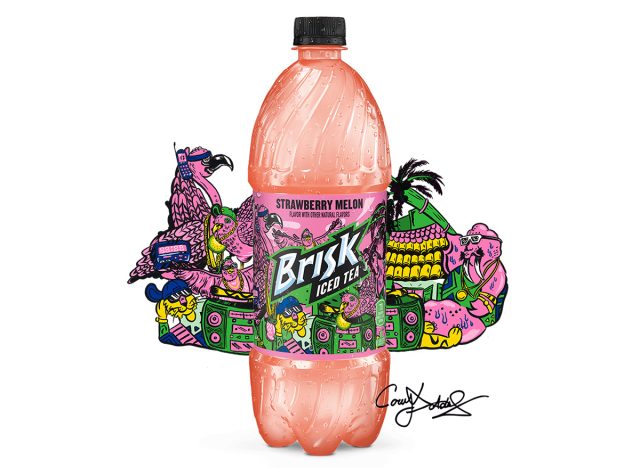
Calories: 70
Fat: 0 g (Saturated fat: 0 g)
Sodium: 120 mg
Carbs: 34 g (Fiber: 0 g, Sugar: 17 g)
Protein: 0 g
Brisk’s Strawberry Melon Iced Tea is packed with anything but tea. Green tea powder is the eighth ingredient on the list after such dubious terms as high fructose corn syrup and sodium polyphosphates (a preservative). This “tea” includes 17 grams of added sugar and 120 milligrams of sodium. The electric pink color is derived from Red 40 and Blue 1, the former of which has been shown to increase attention deficit, especially in children, and chronic inflammation. If you’re a true tea lover, we recommend giving this drink a wide berth. There’s plenty more to choose from on market shelves.
Worst: Snapple Half n’ Half Lemonade Iced Tea
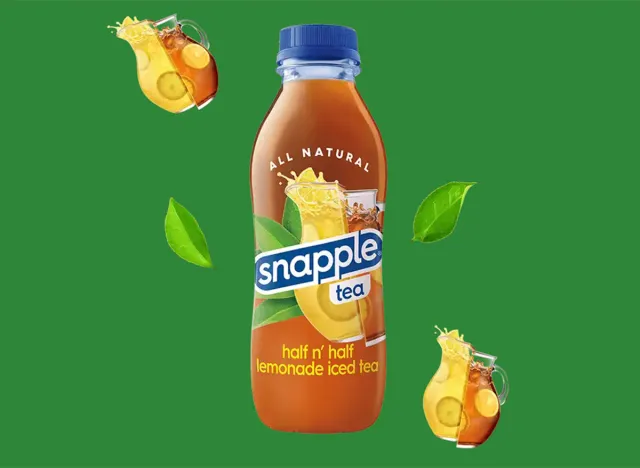
Calories: 210
Fat: 0 g (Saturated fat: 0 g)
Sodium: 10 mg
Carbs: 51 g (Fiber: 0 g, Sugar: 51 g)
Protein: 0 g
Snapple’s Half n/ Half Lemonade Iced Tea is a sugar bomb. With 50 grams of added sugar—101% of your daily sugar recommendation—tea is the last ingredient. This bottled tea also doesn’t go into what kind of tea is actually in your drink. Clearly, it’s some form of black tea, but unlike other tea brands, we don’t get a clear picture of what you’re actually consuming and from where it was sourced. Save those 210 calories for a more nutrient-packed snack that will fill and satisfy you.
Worst: Turkey Hill Dairy Orange Tea
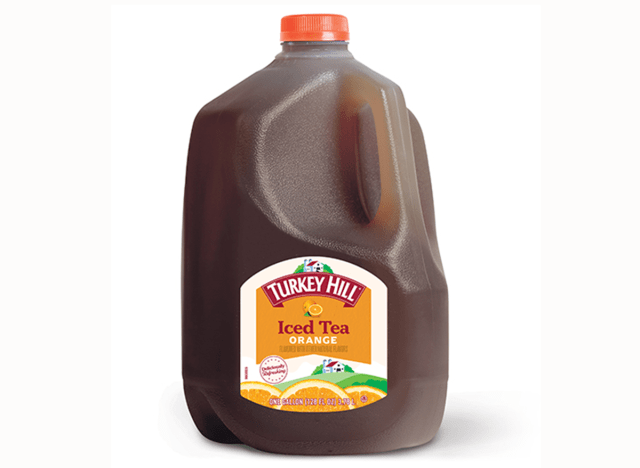
Calories: 150
Fat: 0 g (Saturated fat: 0 g)
Sodium: 15 mg
Carbs: 38 g (Fiber: 0 g, Sugar: 36 g)
Protein: 0 g
After water, Turkey Hill Dairy’s Orange Tea contains high fructose corn syrup and sugar as their second and third most-used ingredients, respectively. This tea contains a whopping 36 grams of sugar—72% of your daily sugar intake—while providing no additional nutrients despite the addition of orange and pear fruit juices. This tea also utilizes the artificial color Yellow 6, which, according to certain studies, has been found to contain carcinogens such as benzidine.
- Source: Sugita, M., Kapoor, M. P., Nishimura, A., & Okubo, T. (2016). Influence of green tea catechins on oxidative stress metabolites at rest and during exercise in healthy humans. Nutrition (Burbank, Los Angeles County, Calif.), 32(3), 321–331. https://doi.org/10.1016/j.nut.2015.09.005
- Source: Keller, A., & Wallace, T. C. (2021). Tea intake and cardiovascular disease: an umbrella review. Annals of medicine, 53(1), 929–944. https://doi.org/10.1080/07853890.2021.1933164
- Source: Jurgens, T. M., Whelan, A. M., Killian, L., Doucette, S., Kirk, S., & Foy, E. (2012). Green tea for weight loss and weight maintenance in overweight or obese adults. The Cochrane database of systematic reviews, 12(12), CD008650. https://doi.org/10.1002/14651858.CD008650.pub2
- Source: Dietz, C., & Dekker, M. (2017). Effect of Green Tea Phytochemicals on Mood and Cognition. Current pharmaceutical design, 23(19), 2876–2905. https://doi.org/10.2174/1381612823666170105151800
- Source: 2020-2025 Dietary Guidelines for Americans
- Source: Ricciuto, L., Fulgoni, V. L., 3rd, Gaine, P. C., Scott, M. O., & DiFrancesco, L. (2021). Sources of Added Sugars Intake Among the U.S. Population: Analysis by Selected Sociodemographic Factors Using the National Health and Nutrition Examination Survey 2011-18. Frontiers in nutrition, 8, 687643. https://doi.org/10.3389/fnut.2021.687643
- Source: Temple N. J. (2022). The Origins of the Obesity Epidemic in the USA-Lessons for Today. Nutrients, 14(20), 4253. https://doi.org/10.3390/nu14204253
- Source: How much sugar is too much? (2023, May 10). www.heart.org. https://www.heart.org/en/healthy-living/healthy-eating/eat-smart/sugar/how-much-sugar-is-too-much
- Source: Office of the Commissioner. (2023, September 7). Spilling the Beans: How Much Caffeine is Too Much? U.S. Food And Drug Administration. https://www.fda.gov/consumers/consumer-updates/spilling-beans-how-much-caffeine-too-much
- Source: Khan, N., & Mukhtar, H. (2018). Tea polyphenols in promotion of human health. Nutrients, 11(1), 39. https://doi.org/10.3390/nu11010039
- Source: König, D., Oesser, S., Scharla, S., Zdzieblik, D., & Gollhofer, A. (2018). Specific Collagen Peptides Improve Bone Mineral Density and Bone Markers in Postmenopausal Women-A Randomized Controlled Study. Nutrients, 10(1), 97. https://doi.org/10.3390/nu10010097
- Source: Tardy, A. L., Pouteau, E., Marquez, D., Yilmaz, C., & Scholey, A. (2020). Vitamins and Minerals for Energy, Fatigue and Cognition: A Narrative Review of the Biochemical and Clinical Evidence. Nutrients, 12(1), 228. https://doi.org/10.3390/nu12010228
- Source: Gawron-Gzella, A., Chanaj-Kaczmarek, J., & Cielecka-Piontek, J. (2021). Yerba Mate-A Long but Current History. Nutrients, 13(11), 3706. https://doi.org/10.3390/nu13113706
- Source: Kant, R. (2005). Sweet proteins – Potential replacement for artificial low calorie sweeteners. Nutrition Journal, 4(1). https://doi.org/10.1186/1475-2891-4-5
- Source: Scarpellini, E., Basilico, M., Rinninella, E., Carbone, F., Schol, J., Rasetti, C., Abenavoli, L., & Santori, P. (2021). Probiotics and gut health. Minerva gastroenterology, 67(4), 314–325. https://doi.org/10.23736/S2724-5985.21.02910-7
- Source: Freeman, C. R., Zehra, A., Ramirez, V., Wiers, C. E., Volkow, N. D., & Wang, G. J. (2018). Impact of sugar on the body, brain, and behavior. Frontiers in bioscience (Landmark edition), 23(12), 2255–2266. https://doi.org/10.2741/4704
- Source: Zhang, Q., Chumanevich, A. A., Nguyen, I., Chumanevich, A. A., Sartawi, N., Hogan, J., Khazan, M., Harris, Q., Massey, B., Chatzistamou, I., Buckhaults, P. J., Banister, C. E., Wirth, M., Hebert, J. R., Murphy, E. A., & Hofseth, L. J. (2023). The synthetic food dye, Red 40, causes DNA damage, causes colonic inflammation, and impacts the microbiome in mice. Toxicology reports, 11, 221–232. https://doi.org/10.1016/j.toxrep.2023.08.006
- Source: Kobylewski, S., & Jacobson, M. F. (2012). Toxicology of food dyes. International journal of occupational and environmental health, 18(3), 220–246. https://doi.org/10.1179/1077352512Z.00000000034









